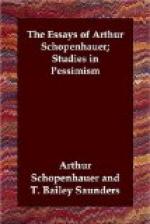It is well known that it is part of an actor’s duty to make a careful study of gesture; and the same thing is true, to a somewhat smaller degree, of a public speaker. This study must consist chiefly in watching others and imitating their movements, for there are no abstract rules fairly applicable to the matter, with the exception of some very general leading principles, such as—to take an example—that the gesture must not follow the word, but rather come immediately before it, by way of announcing its approach and attracting the hearer’s attention.
Englishmen entertain a peculiar contempt for gesticulation, and look upon it as something vulgar and undignified. This seems to me a silly prejudice on their part, and the outcome of their general prudery. For here we have a language which nature has given to every one, and which every one understands; and to do away with and forbid it for no better reason than that it is opposed to that much-lauded thing, gentlemanly feeling, is a very questionable proceeding.
ON EDUCATION.
The human intellect is said to be so constituted that general ideas arise by abstraction from particular observations, and therefore come after them in point of time. If this is what actually occurs, as happens in the case of a man who has to depend solely upon his own experience for what he learns—who has no teacher and no book,—such a man knows quite well which of his particular observations belong to and are represented by each of his general ideas. He has a perfect acquaintance with both sides of his experience, and accordingly, he treats everything that comes in his way from a right standpoint. This might be called the natural method of education.
Contrarily, the artificial method is to hear what other people say, to learn and to read, and so to get your head crammed full of general ideas before you have any sort of extended acquaintance with the world as it is, and as you may see it for yourself. You will be told that the particular observations which go to make these general ideas will come to you later on in the course of experience; but until that time arrives, you apply your general ideas wrongly, you judge men and things from a wrong standpoint, you see them in a wrong light, and treat them in a wrong way. So it is that education perverts the mind.
This explains why it so frequently happens that, after a long course of learning and reading, we enter upon the world in our youth, partly with an artless ignorance of things, partly with wrong notions about them; so that our demeanor savors at one moment of a nervous anxiety, at another of a mistaken confidence. The reason of this is simply that our head is full of general ideas which we are now trying to turn to some use, but which we hardly ever apply rightly. This is the result of acting in direct opposition to the natural development of the mind by obtaining




